- Home
- Nancy Pickard
Say No to Murder Page 7
Say No to Murder Read online
Page 7
chapter
11
It was late that evening by the time I got my dad settled on the Amy Denise.
“It’s awfully small,” he said doubtfully.
We stood side by side at the marina, looking up at the boat on which we’d just stowed his luggage. Now there is only a tiny, privileged minority of people in this world who might consider a forty-two-foot pleasure craft to be small, but Jimmy Cain was one of them. I had anticipated the objection, however, and I was ready for him.
“Yes, Dad, so it’s easy to handle.”
“There’s no crew?”
I swallowed an exasperated retort.
“You’ll have privacy, Dad.”
“But she only does twelve knots,” he complained in the same tone in which a child on Christmas morning might say, “But I didn’t get my train!”
“She may be slow, but she’s steady.” Like a salesman who knew his mark, I closed in for the kill. “Great missions from small beginnings grow,” I intoned, making up epigrams on the spot. “Great men reap what humble seeds they sow.”
My father straightened his shoulders and gazed off into the distance. “How terribly profound,” he breathed. “Shakespeare?”
“Jabberwocky.”
But he was lost in his dreams of strong men and high purpose. “Well,” he said firmly, “I’ll be off then, my dear, to Liberty Harbor to do my duty as a citizen.”
“Don’t dock there,” I warned him. “You’re doing this privately, you know, so we don’t want to advertise your purpose.”
“Jennifer,” he said with great dignity, “you don’t have to tell me my business. I’ll let down anchor in the bay, but I’ll be able to see everything that goes on . . .”—he waved his binoculars at me—“without anyone knowing what I’m up to.” Evidently he thought of himself as a consumer watchdog, Ralph Nader with a tan.
I stood on the dock and waved him, off to Liberty Harbor. As he finally pulled away, with a great fanfare of tooting horns and revving engines, I had the psychic feeling of wiping my hands together and sighing, “Whew.”
I drove to Geof’s house, where we’d been living while he tried to sell it. It was an ugly ultramodern, left over from the second marriage. That wife, Melissa, had left him because she got lonely being married to a cop who was rarely home. She married her lover, a computer whiz with an office in the basement. I wondered, having known a few computer whizzes, if a man couldn’t seem just as distant one flight down as he could at police headquarters. The first wife, Roberta, had a career of her own; she had not objected to his physical absence; it was his mental absence when he was in the same room that she objected to. I asked him once, “When is a cop not a cop?” To which he replied, “When he’s dead.”
Instead of pulling into the garage, I parked in the driveway. I wanted to roll down the window, listen to the grass grow, and savor the solitude. The house, which must have been designed by an architect with a cold heart, was dark. Its owner was working late on the Ansen Reich case.
I thought of Annie Reich.
What was it like in her strange house this night? By now, she knew that her husband had been killed either by mistake or on purpose. How did she feel? Surprised, saddened, outraged? Did she feel anything? Would she, like a goddess, shriek, rend her clothes, tear her hair? No, the image was impossible. More likely, she’d merely drink an extra glass of iced tea. Sweetened.
I fixed myself a supper of leftover vichyssoise and a chicken salad on a croissant, accompanied by a nice, light Riesling wine. A young, female, upwardly mobile repast if ever there was one. The only things missing were a cold pasta salad and a side of quiche.
The wine made me sleepy, so I fixed a cup of coffee, then curled up in bed between piles of grant applications and corporate reports. For a half hour, I sorted through the applications, eliminating the obvious losers . . . “No,” I said to six applicants whose projects extended beyond the town boundaries; “no” to several proposals that would duplicate projects we already funded; “no” to a couple of organizations for whom we would only be throwing good money after bad; “no” to a political action committee who should have known better than to ask; and “no” to a food distribution network that was run by a board of directors that I wouldn’t have trusted any further than I could throw a loaf of the stale bread they dispensed.
It’s depressing to turn down so many people, some of them deserving. Takes a certain steeling of the heart. I was glad when the phone rang and interrupted me.
“Hello,” I said, “Hard-hearted Hannah here.”
Geof laughed. “Something tells me you’re working late tonight. If you’re writing ’no’ in big block letters all over grant applications, I suspect this is not the time to propose.”
“Well, you could fill out a form,” I said, “and I could present your proposal to our board of trustees.”
“Yeah, but they always go by your recommendation. What would you tell them on this one?”
“I’d tell them it was held up in committee, pending on-site investigation and that we ought, perhaps, to weigh the alternatives.”
“They weigh heavily,” he said, “on my mind.”
’I’ll wait up for you.”
“Better not, it’s going to be a late one.” In his pause, I sensed frustration. “You know, from the way you described Ansen Reich to me, I pictured the man having more enemies than Richard Nixon could even imagine.”
“Richard Nixon could imagine a lot of enemies.”
“But Reich seems to have offended everybody he ever met, without actually causing anyone to hate him. I get the impression he was only annoying, like a mosquito.”
“It would have to be an awfully big mosquito,” I said doubtfully. “The Mosquito That Ate Chicago.”
“Well,” he said, “what I’m leading up to is that instead of having too many leads to pursue, and too many suspects, we have too few. Which means, if we can’t solve his murder by viewing it as a separate incident, maybe it is related to the other troubles at the harbor.”
“So you think it’s sabotage.”
“I didn’t say that.”
“But you think the acts are connected?”
“I didn’t say that, either.”
“I’m not a reporter, Geof. Tell me what you think!”
“I would,” he said irritably, “if I could.”
“In other words, you don’t know.”
“You’re quick tonight.”
I clamped my jaw and waited for an apology.
Finally he said, “You shouldn’t ever think that they had no grounds for divorce.”
“I’m going to change the subject now,” I said.
“I think that’s a good idea.”
“Geof, some of the members of the Liberty Harbor Advisory Committee have formed something they call the Citizens’ Watch. It’s a vigilante committee. They plan to patrol the harbor, with guns, I believe.”
He swore. “Don’t tell me, let me guess: Helms, Shattuck, Tower, Tower and Schneider.”
“Schneider wasn’t there. Sullivan.”
“Ted? What the hell’s got into him?”
“He agrees with the rest of them that all this trouble is being caused by somebody who wants to sabotage the project, and I guess he agrees that the police . . . I’m sorry . . . aren’t doing enough about it, fast enough.”
“I don’t suppose,” he said caustically, “they have any bright ideas as to who this saboteur might be? Some shopowner, maybe, who didn’t get the spot he wanted in the mall? Or how about somebody from the Boston Chamber of Commerce who thinks we’re going to steal their tourists?”
I waited a beat. “I, on the other hand, think the police are wonderful.”
He laughed. “I’ll tell Ailey.”
“Mañana,” I said.
“Which is more than I deserve,” he said, and hung up.
I lifted a corporate report from the pile on the bed and leafed through it. The phone rang again.
Forgetting I wasn’t at the office, I said: “Jenny Cain.”
“Nigger lover,” a voice breathed. “You keep away from that ugly preacher or you’ll be the next body in the bay.” He branched out from there to describe interracial sexual activities. I hung up on him. At least, I assumed it was a he. The voice was vaguely familiar, which made the call all the more unnerving.
“Damn you,” I said to the telephone. I was loath to touch it again, as if the slime might ooze out of the receiver to contaminate me. But I wanted to talk to the one person who could comfort the frightened, results guaranteed. So the disgusting call could not infect my night and ruin it, I looked up a number in my personal directory, and dialed.
“Helping Friends,” a gentle voice said clearly and distinctly. It was the suicide center. “My name is Ida. May we help you?”
“Mrs. Basil, please.”
“I’m sorry,” the young voice said. “We are not allowed to acknowledge the last names of our volunteers.”
“All right.” I tried a sneak attack from another lank. “May I speak to Faye?”
“Sure,” the voice said cheerfully.
“This is Faye,” said a motherly voice. “May I help you?”
“It’s Jenny,” I said, feeling better already. “Why won’t they let you give out your last names?”
“Jenny?” She sounded, surprised. “It’s for our protection. Now and then we receive calls from truly unbalanced people.”
“So do I, Faye,” I explained.
“That’s terrible,” she said comfortingly. “But you just don’t give it another thought, Jenny. There are some unpleasant people in this world, but we don’t have to dwell on them.”
I smiled at the now-friendly telephone. Faye had such a life-giving, renewing way about her. If Philly Reich had managed to contact her the night he felt suicidal, he might still be alive. Maybe Faye had been right about that, just as Hardy Eberhardt had been correct in predicting the reaction to our being photographed together.
With her sweet nature, Faye cleansed the phone lines that had been fouled. Before I extinguished the lights in the bedroom, I turned on the phone-answering machine so that filthy-minded bigots could not disturb my dreams.
I slept fine, thank you.
It never occurred to me to wonder if Hardy had received a malignant message, too.
chapter
12
Sunday, We had to park five blocks away from the church to find a space. The mayor’s venture into all-black territory was an event the local, media had heralded like the second coming. Only this was a first coming.
In the sanctuary, white faces wearing eager-to-please expressions bobbed like marshmallows in chocolate sauce. In short order, I spied every member of the advisory committee and most of the town council. The Democrats looked stunned and suspicious.
I also recognized four plainclothes cops.
“That’s offensive,” I complained to Geof. He was elegant in summer pinstripes; I was hot in silk. There’d been no more trouble all week, nor any hint of trouble for this day.
“It’s meant to be defensive,” he said, his eyes scanning the crowd. “You never know what sort of racist nuts an event like this will attract. We could get one of those die-for-Allah crazies, or a ripe banana from the KKK. Eberhardt knows they’re here. If he’s not offended, why should you be?”
“Are you annoyed with me? Or with white suburban liberals in general?”
He squeezed my hand. “Sorry, it’s the cop coming out in me. I don’t like to throw firecrackers like Schneider and Eberhardt on the same pile. Somebody might get careless and light a match.”
We threaded our way down the crowded aisle. In the front row, Mary Eberhardt waved at me and I waved back. Betty and Pete Tower sat directly behind her, their backs as stiff as hymnals.
“Amazing,” I whispered. We excused our way past five pairs of feet and into the center of a pew. “In Pete’s and Betty’s church, the basic sermon is ’God’s in His Heaven, All’s White with His World.”
“I’ll be damned,” Geof said. “What the hell is she doing here?” An elderly black man in front of us turned around and raised a stern eyebrow at Geof’s language. The thirty-four-year-old detective murmured meekly, “Excuse me, sir.”
“What’s who doing here?” I asked. “Betty? She’s on the advisory com—”
“No.” He took my chin and swiveled it around toward the back of the church. There in the last row, large and dully white, sat Annie Reich.
But she was not the most eye-catching addition to the church that day, for on the altar where Barbara would speak there hung a wooden cross that looked suspiciously like the one that Hardy and Mary had proposed for the Unmarked Grave.
Oh Hardy, I thought, you sly dog.
Neither painted nor varnished, the cross was obviously of recent and quick construction. Its vertical shaft was about two feet long, the crossbar spanned a foot, and each bar was about four inches wide and an inch across. What gave the game away, however, was the bottom of it which had been whittled to a dull point that would be just right for pounding into the ground. When the mayor spoke, all eyes would be fastened on the fait accompli that hung before her.
My eyes, however, were fastened on a procession coming down the center aisle. It was not the minister and his choir. It was my father, trailed, by a photographer and someone who looked terrifyingly like a reporter.
“Oh, my Lord,” I breathed, “let us pray.”
My father was affecting a grand entrance—all silver hair, tanned face and big smile. As he made his way down the carpet, he nodded at faces he recognized. They stared back at him. A whisper began that rolled along the pews like a wave on the ocean. “Jimmy Cain is back!” “Isn’t that Jimmy Cain?” “How dare he show his face in this town!” The reporter looked as if he had died and gone to heaven.
I had merely died, or wished I could.
He didn’t see me, which may have had something to do with the Tact that I was hunched down in my seat. “What’s the matter with you?” Geof asked.
“I was born,” I replied.
But I didn’t have to leap instantly to my father’s rescue because, just as he slid gracefully into a pew toward the front, the organ came to my rescue with a crashing chord.
Hardy Eberhardt marched from a side entrance to his pulpit, his blue robes flowing. The force of his presence brought the congregation to silence.
“Brothers and Sisters!” he said into the microphone. “We welcome our visitors this day to the blessed home of the Risen Christ!”
“Amen, Brother Eberhardt!”
“Let us pray,” said Hardy, “to the glory of the Lord God Almighty!”
And so we prayed, some of us more fervently than others; and for the next twenty minutes we listened to scripture, we sang roof-raising hymns, we swayed in our pews to the rolling anthems of the choir. And then we sat down again.
Expectantly.
“Brothers and Sisters in the Lord.” Hardy began with a near-whisper that forced us to lean forward in our pews. Then with every sentence, he raised the volume and the passion. “Brothers and Sisters, the Lord God brought His children out of Canaan . . .”
“Amen!”
“Out of degradation and deprivation, out of anguish and agony, out of death and destruction, the Lord God delivered His children!”
“Praise God!”
“And His children were grateful unto Him, were they not?”
“Yes, Lord.”
“And built Him a temple, did they not?”
“Yes, Lord.”
“To the glory everlasting of the Lord God Almighty, His children raised a temple to honor His holy name. And I say unto you this day, you children of that same holy God, I say unto you . . . when the Lord delivers us from evil, it behooves us to bestow all honor upon Him!”
“Thank you, Lord!”
Hardy raised his arms above his head so the blue robes flew like angels’ wings. “If the Lord God sees it in His unques
tionable wisdom to bestow the blessings of life everlasting upon us, His children, how shall we honor Him? As a child honors his parents, so shall we honor Him! So shall we build a place upon this Earth where men shall know our suffering, where men shall know our trials, where men shall know the jubilation of our liberation!”
Hardy walked around to the front of the pulpit. He detached the wooden cross and thrust it high above his head and toward the congregation.
“Upon a cross the Lord our God sacrificed His only Son for us! Upon a cross! And the angels rolled away the stone and He rose again!”
“Yes, Lord!”
“Lord, my God.” Hardy raised his face to the heavens and closed his eyes. “We will dig a grave in Thy earth. Into that grave we will pour the bitterness of our sufferings. We will cover that bitterness with healing earth! We will mark that grave with the Messed cross of Jesus, the empty cross from which He did descend . . .”
He opened his eyes to stare straight at his congregation.
“We shall mark that grave with the cross from which our people did also descend forever from the death of slavery! Yes, Lord!”
In the breathless silence, he lowered his arms. Gently, with bent head, he propped the cross lovingly against the pulpit in plain view of all. He stepped back behind the pulpit, leaned into the microphone and said gently, “Brothers and Sisters, I give you the Honorable Mayor of this city, our beloved Sister Barbara Schneider.”
Sister Barbara rose from her front-row seat beside Mary Eberhardt, pale with the knowledge that she would never live this down among the more rock-ribbed of her Republican supporters, and realizing that she now had about as much chance of persuading this audience as the Pharaoh’s men had when the Red Sea rushed over them.
The congregation stirred briefly again. It was like coming out from under the spell of a master hypnotist; we blinked our eyes at the real world.
Barbara lifted the cross and quietly placed it out of sight behind the pulpit. Gutsy and smart, I thought. She looked out over us, waiting patiently for us to settle down.
“Thank you,” she said clearly, graciously, “for welcoming me as your Sister. We are, indeed, a family that is united in our enthusiasm for the great economic revival that Liberty Harbor represents for all of us, black or white, young or old, Republican or Democrat.”

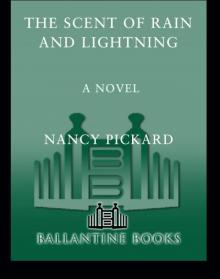 The Scent of Rain and Lightning
The Scent of Rain and Lightning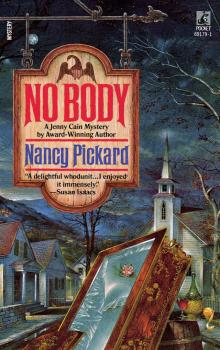 No Body
No Body The Secret Ingredient Murders: A Eugenia Potter Mystery
The Secret Ingredient Murders: A Eugenia Potter Mystery The 27-Ingredient Chili Con Carne Murders: A Eugenia Potter Mystery
The 27-Ingredient Chili Con Carne Murders: A Eugenia Potter Mystery Twilight
Twilight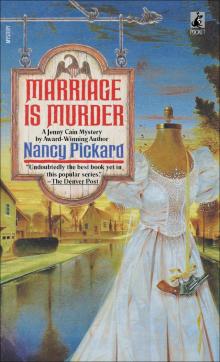 Marriage Is Murder
Marriage Is Murder I.O.U
I.O.U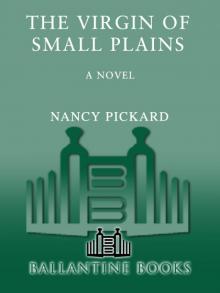 The Virgin of Small Plains
The Virgin of Small Plains Generous Death
Generous Death The Whole Truth
The Whole Truth The Blue Corn Murders
The Blue Corn Murders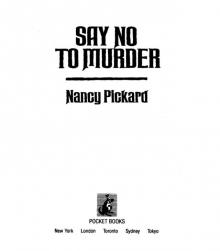 Say No to Murder
Say No to Murder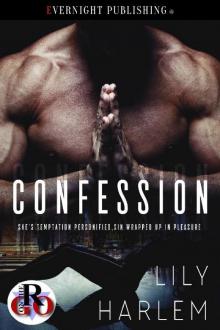 Confession
Confession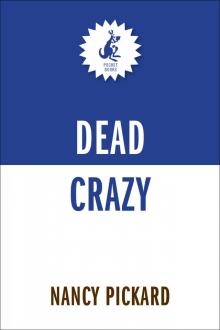 Dead Crazy
Dead Crazy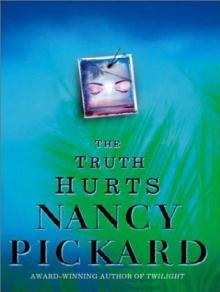 The Truth Hurts
The Truth Hurts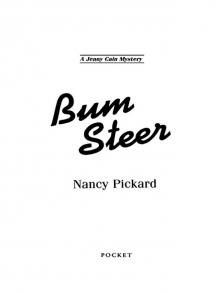 Bum Steer
Bum Steer